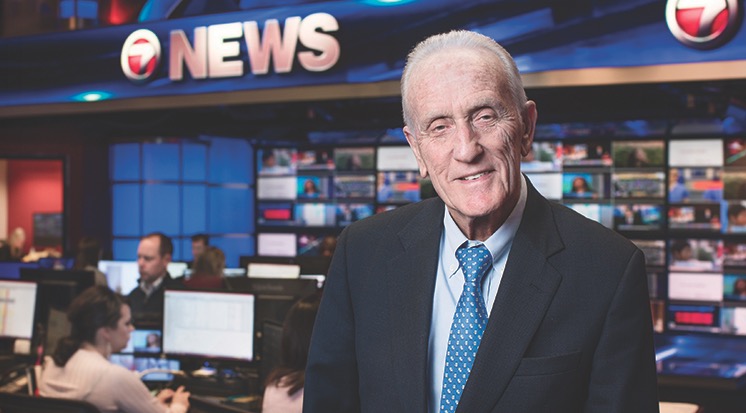Going Strong—and Independent—in Boston

The smarter way to stay on top of broadcasting and cable industry. Sign up below
You are now subscribed
Your newsletter sign-up was successful
So far, 2017 has been a pretty good year for Sunbeam Television’s Ed Ansin, who Jan. 1 relaunched his longtime Boston station, WHDH, as a news-heavy independent after NBC yanked the station’s affiliation agreement to launch its own O&O.
Less than five months into the station’s new incarnation, Ansin says WHDH is doing better than expected.
Audiences are strong. With the help of roughly 30 new staffers, WHDH’s 10 p.m. newscast in February and March topped WFXT, Cox Media Group’s Fox affiliate, for the first time, according to Nielsen ratings provided by WHDH. Its new 9 p.m. newscast — the market’s first — is gaining traction, ratings show. Advertisers are responding, leading to robust sales, he said.
On top of that, Ansin is walking away from the FCC spectrum auction with a cool $162 million, which he got for the spectrum now occupied by his Boston affiliate of The CW, WLVI. That station will still air uninterrupted under a channel-sharing arrangement with WHDH.
Ansin, whose portfolio also includes Miami Fox affiliate WSVN, spoke with B&C contributing editor Diana Marszalek about doing business as an independent, whether the model is sustainable and what keeps viewers hooked. An edited transcript follows.
Is the revamped WHDH performing as you’d hoped?
It’s doing better than I had hoped in reality. It’s doing really well.
What are the business challenges of operating an independent?
Initially, being an affiliate was a better model, primarily because networks have special events and sports and those are important. And we used to have “Must-See TV,” and that was extremely strong. But on the other hand, we have the opportunity to build a powerhouse news station, we have a lot more inventory to sell and hopefully we will.
The smarter way to stay on top of broadcasting and cable industry. Sign up below
Did advertisers stick with you?
Generally speaking, advertisers wanted to see numbers before they made any big commitments. Now that they have seen very good numbers, they are on board and we’re doing well.
Yet it’s not cheap building out a news operation.
We want to build a big, powerful news service, and to do that you have to invest money, you have to invest time and you have to start being more aggressive. You also have to think of it differently, because you’re running more programming, and you can’t run more programming effectively unless you’re willing to spend on it.
We’re running news at 9, 10 and 11 p.m., which is working very well. What we’ve added is also innovative: We are running Family Feud in prime time.
Audiences seem to be liking what you’re offering.
One reason it’s working so well is that prime time and the networks are not as strong as they used to be. In general, the viewing is down because people are recording shows and not watching them in prime time. We also thought there would be a market in giving viewers an option whether they want to watch the news at 9 or 10 or 11. We think that viewers are in fact making that choice night-to-night on their schedule, and it’s something new.
You had a similar situation at WSVN in Miami, which switched from NBC to Fox.
We did it 30 years ago, so having that background and experience helped a lot. Fox was just starting at that point. Originally, they gave us just one night of programming and then added one night per week over a period of time. And being a Fox station is different than being with the other networks because basically, they give you two hours of prime time tonight, and they don’t give you any newscasts — although they do give you football, which is very advantageous. What we’re doing here in the morning, for example, is running five hours of news from 5 a.m.-10 a.m., and that’s exactly what we did in Miami.
Any more changes in the works?
We don’t have any changes in mind. It’s working. We are going to continue doing the very best we can.
Do you feel like you made the right choice taking WHDH independent?
If we were going to stay in the broadcasting business, it was the only option we had.
